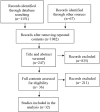COVID-19 Amplifiers on Health Inequity Among the Older Populations
- PMID: 33520919
- PMCID: PMC7844317
- DOI: 10.3389/fpubh.2020.609695
COVID-19 Amplifiers on Health Inequity Among the Older Populations
Abstract
The coronavirus disease 2019 (COVID-19) is affecting the population disproportionately and is continuously widening the health gap among the population. Based on some recent studies on COVID-19 and the older population, the various cascades toward health inequity have been projected. This study highlights how the COVID-19 is met by health inequity triggers, such as global trade inequality, ageist social regulations, and the existing social inequity. While those triggers are applicable to all the populations, there seems to be specific amplifiers for health inequity among the older populations. In particular, six types of amplifiers have been identified: (1) expansion of riskscape, (2) reduction of social ties, (3) uncertainty of future, (4) losing trust in institutions, (5) coping with new knowledge, and (6) straining on public spending. While the fundamental mitigating responses to health inequity among the older population is tackling existing inequalities, this study may help to shed light on emerging vulnerabilities among the older population to alleviate far-reaching consequences of COVID-19 of the identified inequity amplifiers.
Keywords: COVID-19; aging; health equity; public health policy; social determinants.
Copyright © 2021 Lee.
Conflict of interest statement
The author declares that the research was conducted in the absence of any commercial or financial relationships that could be construed as a potential conflict of interest. The reviewer CJB declared a shared affiliation, though no other collaboration, with one of the authors SL to the handling Editor.
Figures
References
-
- WHO Coronavirus Disease (COVID-19) Situation Report-127. (2020). Available online at: https://www.who.int/docs/default-source/coronaviruse/situation-reports/2... (accessed September 22, 2020).
Publication types
MeSH terms
LinkOut - more resources
Full Text Sources
Other Literature Sources
Medical
Miscellaneous


